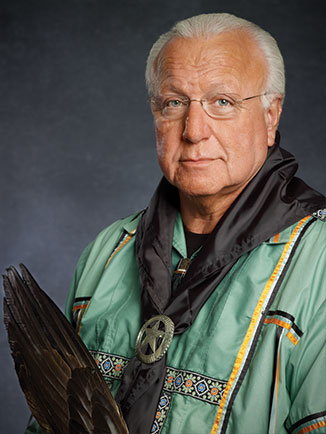Bozho Nikan, (Hello, my friend)
Tribes and City government disputes seldom make headlines. Most recently, and unfortunately, they have. The sales tax controversy in which the City of Shawnee is attempting to tax the four tribes near town, particularly the retail operations at the Citizen Potawatomi Nation, is heating up. What people may be missing is the fact that the land on which tribal governments operate is deeded to the United States and held in trust.
A similar situation exists in Midwest City. Given its massive economic impact, it would be strange to see Midwest City and Del City disparage the role Tinker Air Force Base has on the state economy and the economy of the Oklahoma City metropolitan area. The people who live in these communities would be understandably puzzled if their elected leaders began threatening one of the largest employers of the very citizens who elected them.
Yet the role of the Indian Nations in Oklahoma, also on federal land, is not seen in the same light. All too often in Oklahoma, the economic impact, jobs and development created by Native American tribes gets taken for granted.
The numbers don’t lie. In the last year alone, Oklahoma’s 39 federally recognized tribes had a $10.8 billion impact and directly employed more than 50,000 people. Tribal payrolls contributed a total of $1.5 billion to the state’s economy. Tribes also made payments of $792 million for improved access to medical care, education, social services and economic development opportunities.
Tribal business has become a normal part of the daily life in this great state. Tourism destinations, job creation, business diversification and improving quality of life can all be traced back to tribal economic development.
In many cases, particularly in rural areas, Oklahoma’s tribes are the only source of livelihood and prosperity for the communities where they do business. That development comes at a cost though, and tribes have struggled to make economic dreams a reality throughout the years. The boost from gaming has helped tremendously, but tribes must continue to diversify and create a tax base to further economic development and job creation.
The Citizen Potawatomi Nation has begun to flourish because of such strategic planning and stable governance. A clear direction and plan to become the economic engine for our Tribe and the communities near us has allowed us to increase our assets from just $50,000 in 1972 to today’s economic impact of more than $520 million. {jb_quoteright}”The numbers don’t lie. In the last year alone, Oklahoma’s 38 federally recognized tribes had a $10.8 billion impact and directly employed more than 50,000 people.”{/jb_quoteright}
Without Tribal development there is little growth in our cities or state. Oklahoma’s Tribes are the largest employers statewide. Our employees spend their paychecks in thousands of businesses across Oklahoma, all while tribes continue to offer services and economic stimulation through their very presence. Simply put, without tribal job creation, sales tax growth is not possible.
Tribal governments, businesses and social services form an integral part in the fabric of this great state. Attempting to punish Oklahoma’s tribes for their success is a questionable strategy, and misguided attempts to stifle that success will only result in all Oklahomans losing out, no matter what their heritage.
Migwetch,
John “Rocky” Barrett, Keweoge
Tribal Chairman
